‘Natural Born Killers’: Why the most scandalous film of the 1990s could have been written today
Oliver Stone’s ultraviolent satire, which reflected a moment when the media lost its way and elevated criminals to superstar status to gain audiences, fits perfectly into the era of fake news and the saturation of true crime on streaming platforms
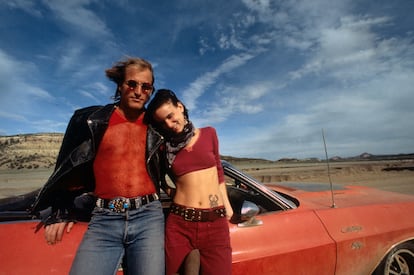
“It’s detestable. It’s the product of a schizophrenic director” was the blunt opinion of Pilar Miró on Natural Born Killers. Miró was one of the 3,000 people who saw the film at the Anoeta Velodrome during the San Sebastian Film Festival, “the best movie theater in the world” in the words of the “schizophrenic” director of the film, Oliver Stone. The man behind Platoon and Born on the Fourth of July had heard similar things at other festivals. Cannes had rejected it on the grounds that it was too violent. Venice did make room for it and the reception was so enthusiastic that the organizers suggested it was a strong candidate to win the Golden Lion. In the end, it had to settle for the Jury Prize. According to Stone himself, during the deliberations, the writer Mario Vargas Llosa had shouted that they would only give it the grand prize “over his dead body.” It was just a foretaste of what was to come: the wrath of the media, the lawsuits and the murders, a succession of incidents that would earn it the title of the most controversial film of the decade.
Natural Born Killers, the story of Mickey and Mallory Knox, a serial killer couple who spread terror while the media turned them into pop celebrities, began as a script by Quentin Tarantino, at that time the director of a single, medium-length film that had gone largely unnoticed. Unable to get it off the ground, Tarantino sold the rights for just $10,000 to Jane Hamsher and Don Murphy, two producers as clever as they were inexperienced, and the script ended up in the hands of Stone, who was looking for a project after the failed Heaven and Earth (1993). The director of JFK and Salvador was attracted by what on paper was “an action movie that Arnold Schwarzenegger would be proud of.” He did not imagine then that it would end up being almost completely rewritten to fit the zeitgeist of the early 1990s.
“It was about capturing that horrible period, from 1992 to 1994, when there was one bloody, sensational scandal after another,” he said, referring to such media-driven events as the Menéndez brothers, the skater Tonya Harding, Lorena Bobbitt, or the O. J. Simpson case. Extremely violent acts that filled hours of television with audiences in the millions. Natural Born Killers focuses on the fascination that gruesome events arouse and on the responsibility of the media when reporting on them. When asked what triggered this situation, Stone pointed to the moment when news stopped being a public service and became a business, another consequence of the voracious Reagan era that broke the tacit pact on information. Newscasts became lucrative spaces and that meant waving goodbye to ethics and — why not — to the truth as well. Goodbye to proven facts, hello to information turned into entertainment.
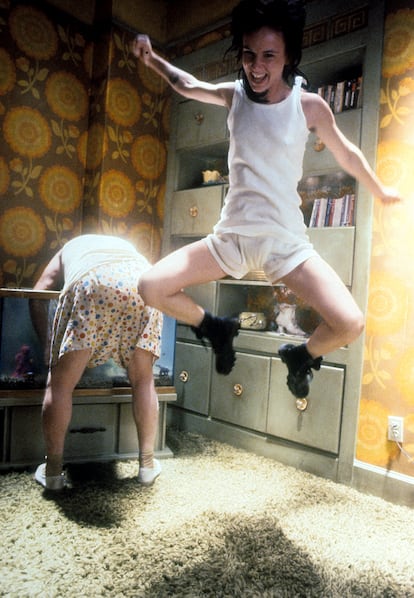
Stone wanted Michael Madsen for the lead role, but according to the Reservoir Dogs star, Warner Bros put $20 million on the table for Woody Harrelson, who was hugely popular at the time due to his role as the good-natured, lackluster waiter in Cheers. The director enthusiastically agreed: “I thought he was kind of a psychopath. That’s why I liked him. He had blue, empty eyes and a lot of Midwestern American qualities.” Another thing made him a perfect fit: his father, Charles Harrelson, was a hitman who was in prison at the time for murdering a federal judge.
Mallory was harder to cast. The fact that she was a victim of sexual abuse led Stone to approach singer Tori Amos, as recounted in the biography All These Years. She accepted the role, but when the director told her that every time Mallory killed someone, her song Me and a Gun (inspired by a rape the singer had suffered) would be played, Amos slapped him and walked out. During her audition, Juliette Lewis, aware that her character’s main characteristic was her unpredictability, jumped on the director’s desk, grabbed him by the neck and shouted: “If you think any of these other actresses could physically kill you, like I could, then hire them!” The part was hers.
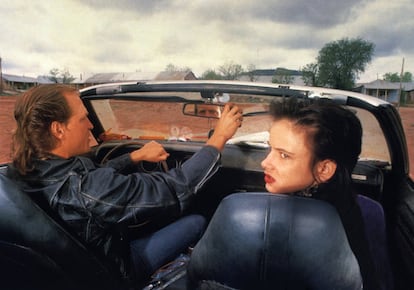
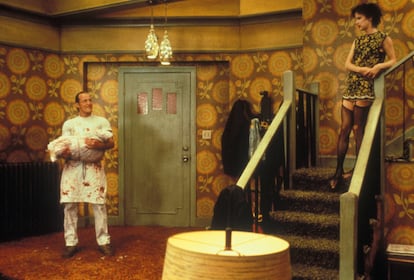
Stone also approached Tim Roth and Steve Buscemi, who declined to appear in the film after Tarantino threatened to never cast them in his movies again. After the success of Reservoir Dogs, Tarantino was Hollywood’s new enfant terrible and was also the main enemy of his old script being realized. Robert Downey Jr., who was struggling with addiction, and Tommy Lee Jones, who, according to him, based his excessive interpretation of the repulsive Warden McClusky on Moliere’s The Bourgeois Gentleman, agreed to participate. Even stranger was the appearance of Rodney Dangerfield, one of the most popular comedians in the United States, as Mallory’s abusive father. Unable to understand why his repulsive character was being presented as the protagonist of a sitcom, he demanded that all his lines be rewritten.
The shoot — which began on the same day that Stone’s wife asked for a divorce, something the director himself has admitted affected the tone of the film — is one of the most chaotic in history. The brutal final riot was filmed in a real prison with dangerous inmates acting as extras who, according to Tom Sizemore in the DVD commentary, continually hurled sexual insults at Lewis and Downey Jr. As they walked through the basement galleries, they felt the sewage that was seeping through the pipes fall on them, and the cold and humidity gave Lewis pneumonia. To maintain the tension, during breaks Stone blasted music from the speakers at full volume. According to producer Jane Hamsher, working with Stone “was hell.”
“He’s a maniac,” she wrote in Killer Instinct. “Being with him makes you feel like you’ve been on drugs for days.” Trouble had started on location in New Mexico, where the entire crew took psychedelic mushrooms. “The wild, reckless spirit that had inspired the film was beginning to rub off on the cast and crew.” During the sequence where the policeman played by Sizemore tries to assault Lewis’ character, she hit him so hard that she broke his nose. The actor’s scream is real, but Stone didn’t cut it and filming continued. Nor did they stop filming when the extraordinary director of photography, Robert Richardson, who had already won an Oscar for his work on JFK, nearly lost an eye. Stone’s almost messianic confidence in the project went so far as to convince Harrelson and Lewis to walk among more than 150 real rattlesnakes, assuring them that, since the scene was being filmed at night, most of them would be asleep. They weren’t.
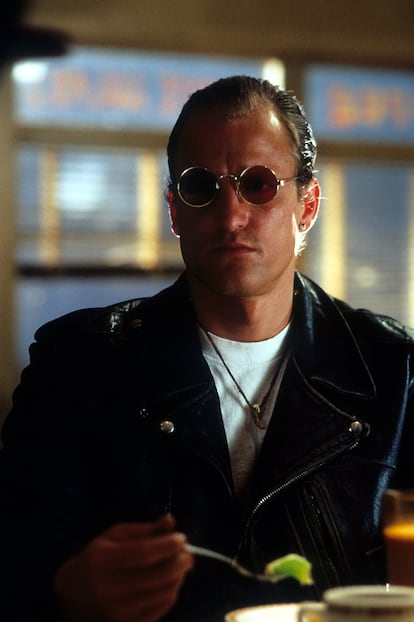
While the shoot lasted just 56 days, editing took almost a year. And the dazzling result justifies that investment. Over the course of two hours there are eighteen format changes. If a normal film has an average of 600 cuts, Natural Born Killers has 3,000. The perfection of the soundtrack is not far behind: Trent Reznor, leader of Nine Inch Nails, watched the film more than 50 times to “get into the mood” and, in addition to his prodigious work, he wove a musical collage that forms the backbone of the film and includes hits by Leonard Cohen, Bob Dylan, L7 and Cowboy Junkies. Natural Born Killers was an experimental film disguised as a consumer product.
The same bewilderment that anyone who visited the set suffered was also felt by the MPAA — the body in charge of assigning an age rating — when they saw it for the first time. To avoid the dreaded NC-17 label, the kiss of death at the box office, they had to make 150 changes and carry a written warning for “extreme violence and graphic carnage, for shocking images, and for strong language and sexuality.” This was incomprehensible to Stone, who believes that the film is not about violence but about the consequences of violence. It was also incomprehensible to Tommy Lee Jones, who compared it to Picasso’s famous painting: “No one would consider Guernica violent.”
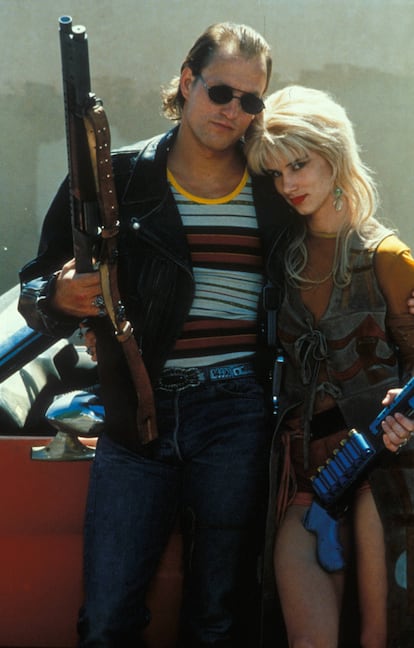
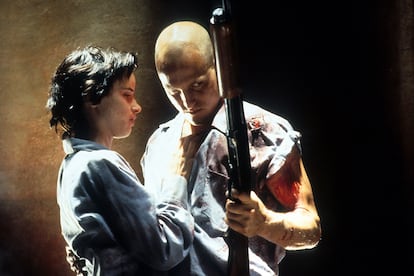
Upon its release critics were divided, but much of the press and politicians saw a goldmine in it. “Why would anyone make a movie where the heroes are twisted lovers on a killing spree?” asked Republican Senator Bob Dole, eager to throw a bone to his puritanical followers. To those who criticized the film, nothing seemed more insidious than its “happy” ending. An alternative ending was also filmed in which Mickey and Mallory are killed by one of the prisoners who help them escape, but Stone chose to let them live, to let their love “redeem them.” Those who accused it of glorifying violence preferred to ignore not only that it is a satire, but that some of the key scenes, such as the interview conducted by Robert Downey J.R.’s character with the killer, are inspired by Geraldo Rivera interviewing Charles Manson in prison, one of the real events that inspired the film.
Natural Born Killers merely reflects the most sordid period of the American media, the rise of sensationalist journalism, and non-stop news coverage and the most unscrupulous talk shows.
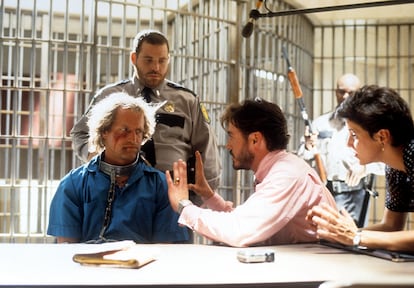
The shockwaves caused by the film also affected the use of product placement in movies. Coca-Cola executives, who had happily given up their cute polar bear ad believing it would appear in a harmless television scene, found themselves at the premiere witnessing it in one of the most violent scenes in the film. They tried to have it cut with all the legal means available, but it was impossible. There was also a regrettable miscalculation: perhaps given the title of the film, it would have been logical to request certain guarantees regarding the placement of their product. “We are concerned that our advertising campaign is being used in a way that was not our intention and of which we were not aware,” the company said in a statement after the premiere.
The controversy surrounding the film was revived after a teenage couple, 19-year-old Sarah Edmondson and her 18-year-old boyfriend, Benjamin James Darras, travelled from Oklahoma to Tennessee after murdering a cotton mill manager and paralysing a shop clerk. After their arrest, it emerged that they had taken LSD and watched Natural Born Killers. The press was quick to call them “copycats” of Mickey and Mallory. They were not the only ones. Watching the film was mentioned in more than 30 crimes. The most infamous copycats were the Columbine killers, who used “NBK” as a codename for their plans. The problems were not limited to the United States: in the United Kingdom, Warner Bros halted the film’s release on video after it coincided with the Dunblane school massacre. It was not the first film, nor was it the last, to be accused of inspiring murder, following in the footsteps of A Clockwork Orange, Taxi Driver and The Matrix.
The backlash caused the film to be banned in Ireland and its release in France delayed. The final straw came when crime novelist John Grisham, the author of novels that became Hollywood hits such as The Firm and The Client, revealed that he was a friend of the murdered manager and personally attacked Stone. “It will only take one big verdict against people like Oliver Stone, and his production company, and maybe the screenwriter, and the studio itself, and then the party will be over.” The trial kept the Hollywood industry in suspense. After years of arguments over whether the film was protected by the First Amendment, the suit was dismissed.
Oliver Stone’s mind-bending film is a visionary work that, tragically, has not lost its relevance: sensationalism is still rife, fake news has generated an unprecedented distrust in the media, and the proliferation of series, documentaries and podcasts dedicated to true crimes shows that the fervor for figures such as Mickey and Mallory Knox has only multiplied rather than waned. Natural Born Killers is about to turn 30 years old, but it seems to have been written yesterday.
Sign up for our weekly newsletter to get more English-language news coverage from EL PAÍS USA Edition
Tu suscripción se está usando en otro dispositivo
¿Quieres añadir otro usuario a tu suscripción?
Si continúas leyendo en este dispositivo, no se podrá leer en el otro.
FlechaTu suscripción se está usando en otro dispositivo y solo puedes acceder a EL PAÍS desde un dispositivo a la vez.
Si quieres compartir tu cuenta, cambia tu suscripción a la modalidad Premium, así podrás añadir otro usuario. Cada uno accederá con su propia cuenta de email, lo que os permitirá personalizar vuestra experiencia en EL PAÍS.
¿Tienes una suscripción de empresa? Accede aquí para contratar más cuentas.
En el caso de no saber quién está usando tu cuenta, te recomendamos cambiar tu contraseña aquí.
Si decides continuar compartiendo tu cuenta, este mensaje se mostrará en tu dispositivo y en el de la otra persona que está usando tu cuenta de forma indefinida, afectando a tu experiencia de lectura. Puedes consultar aquí los términos y condiciones de la suscripción digital.









































